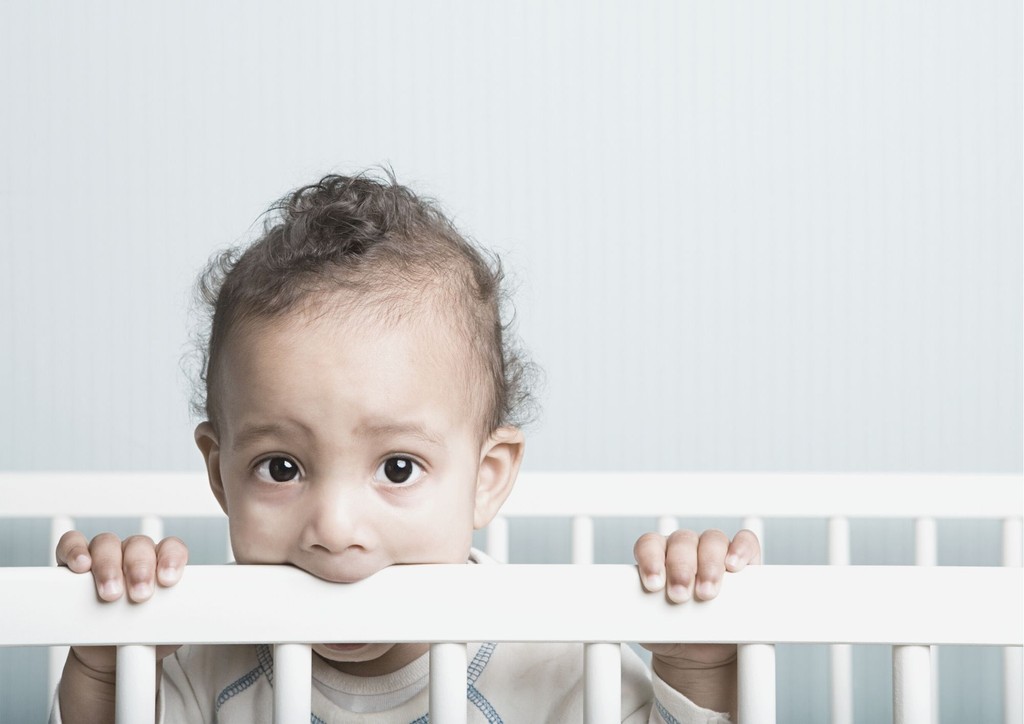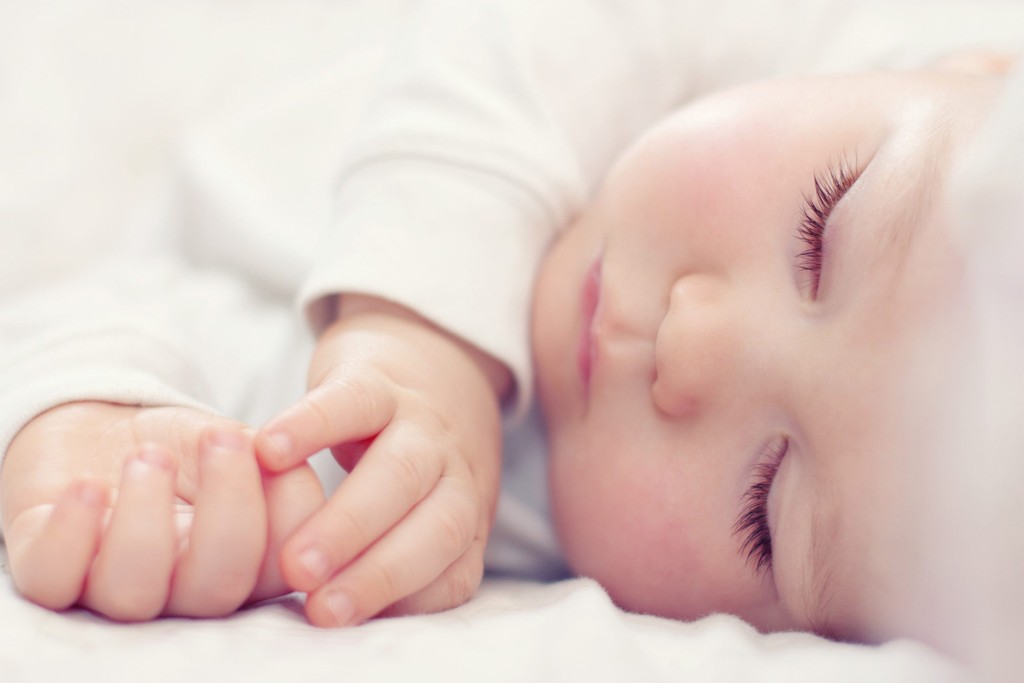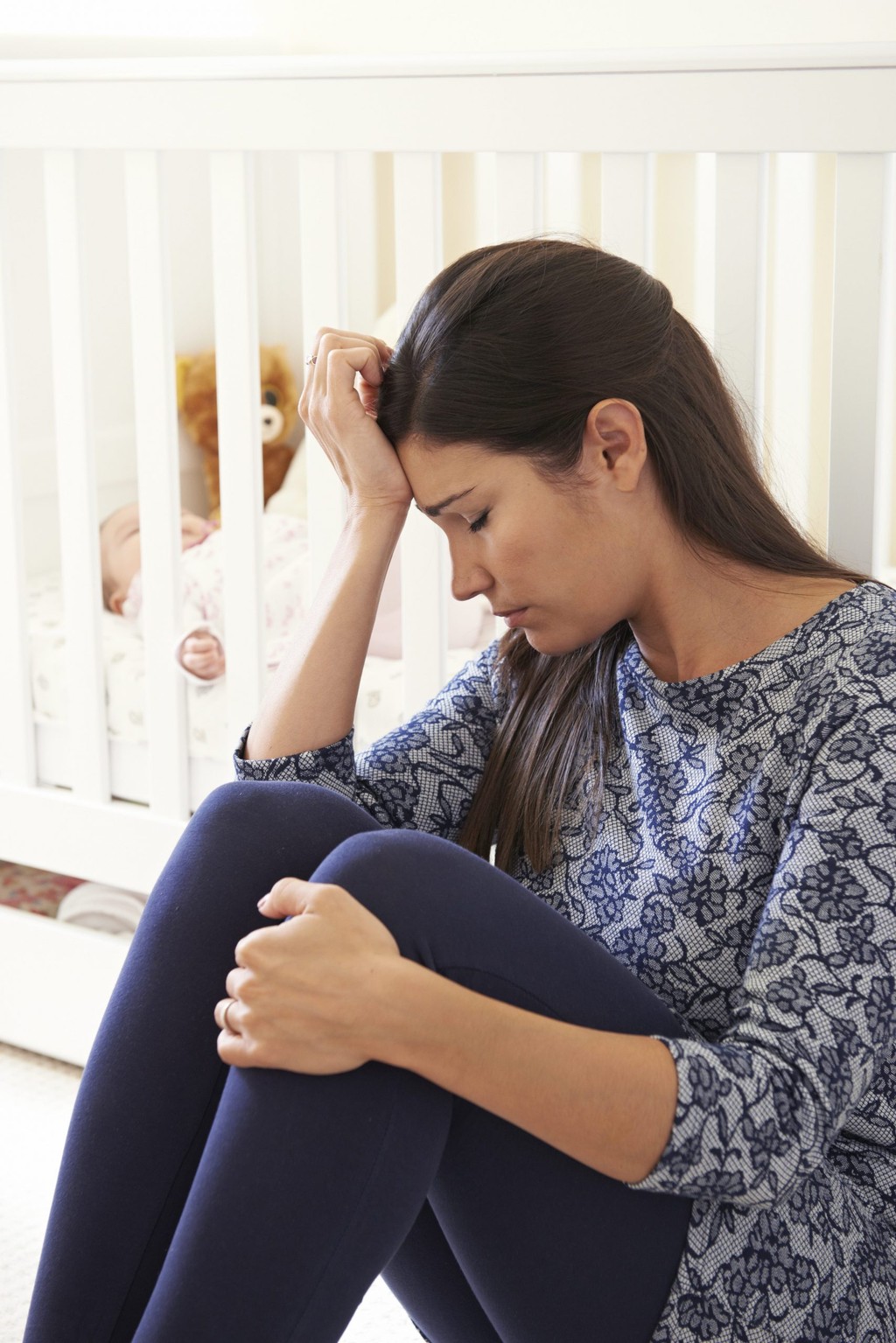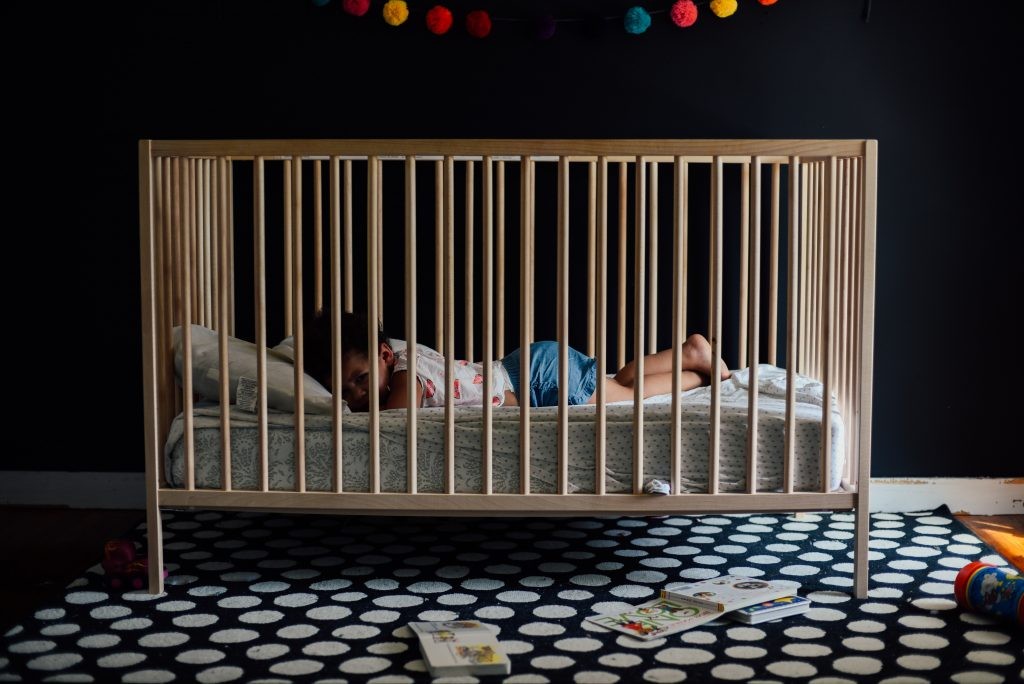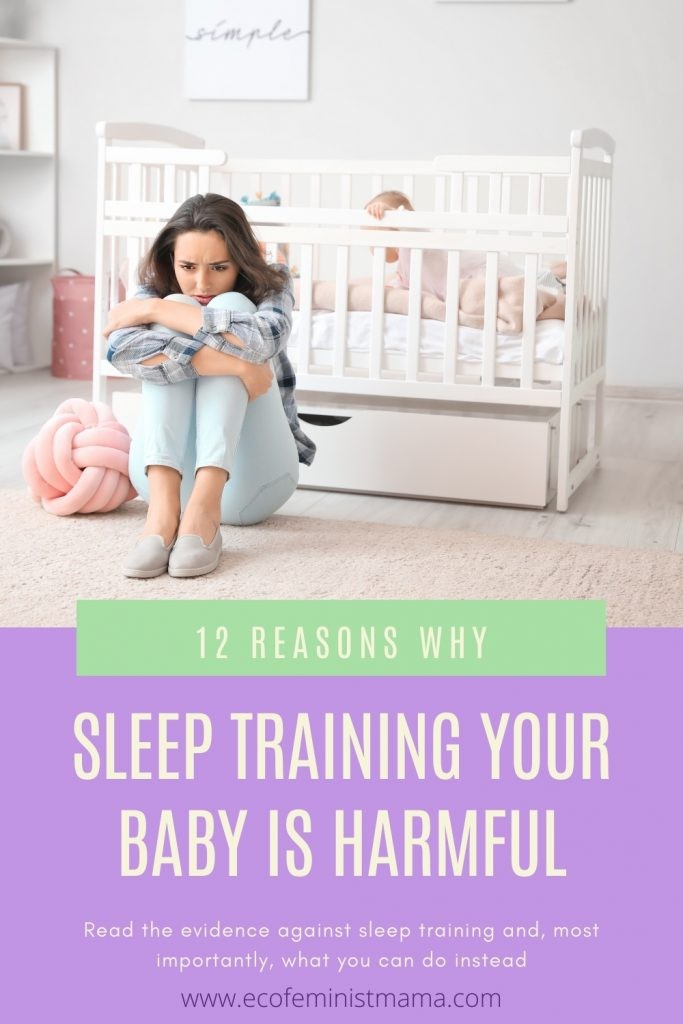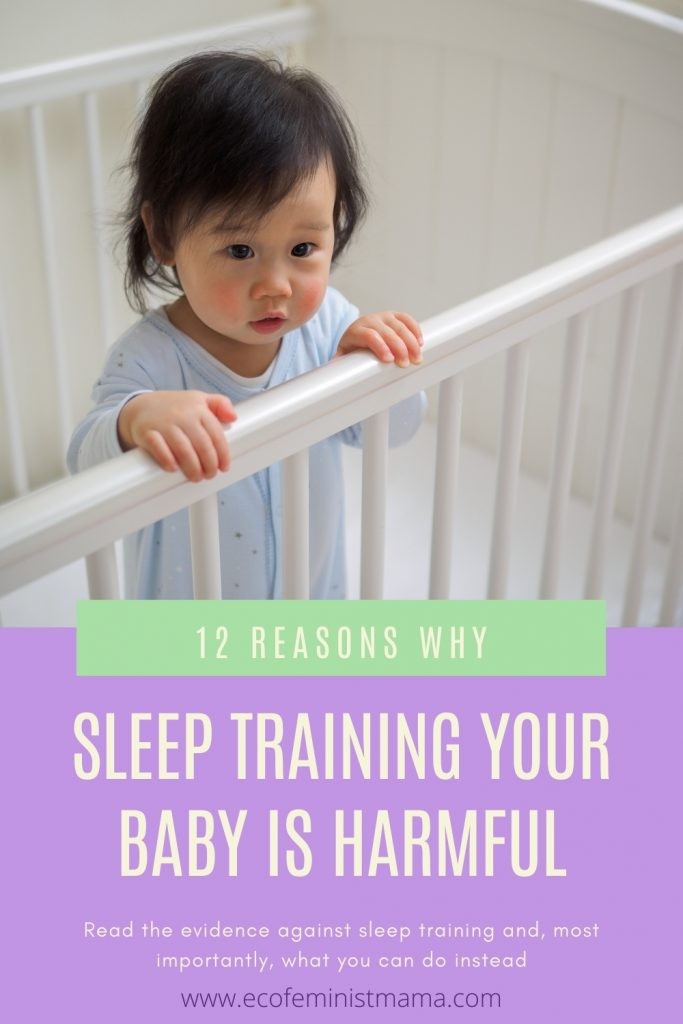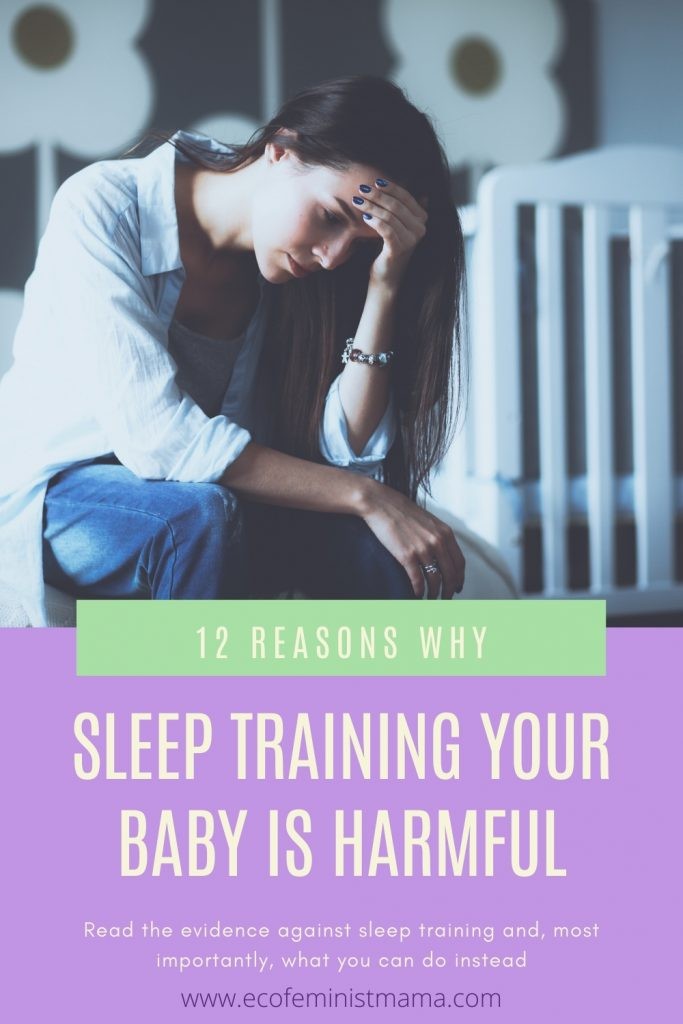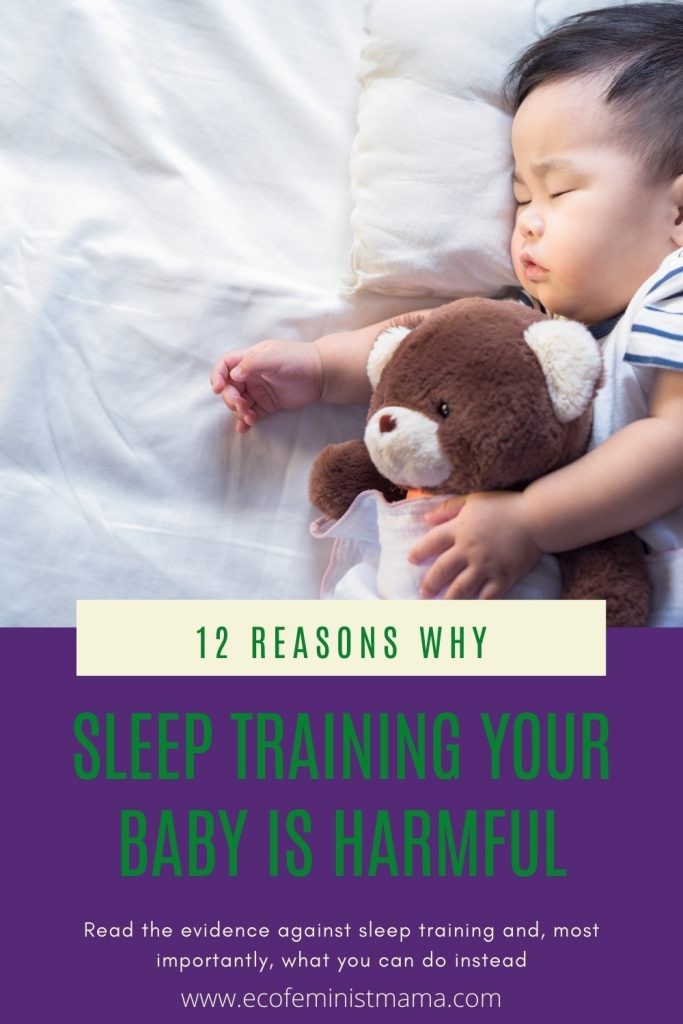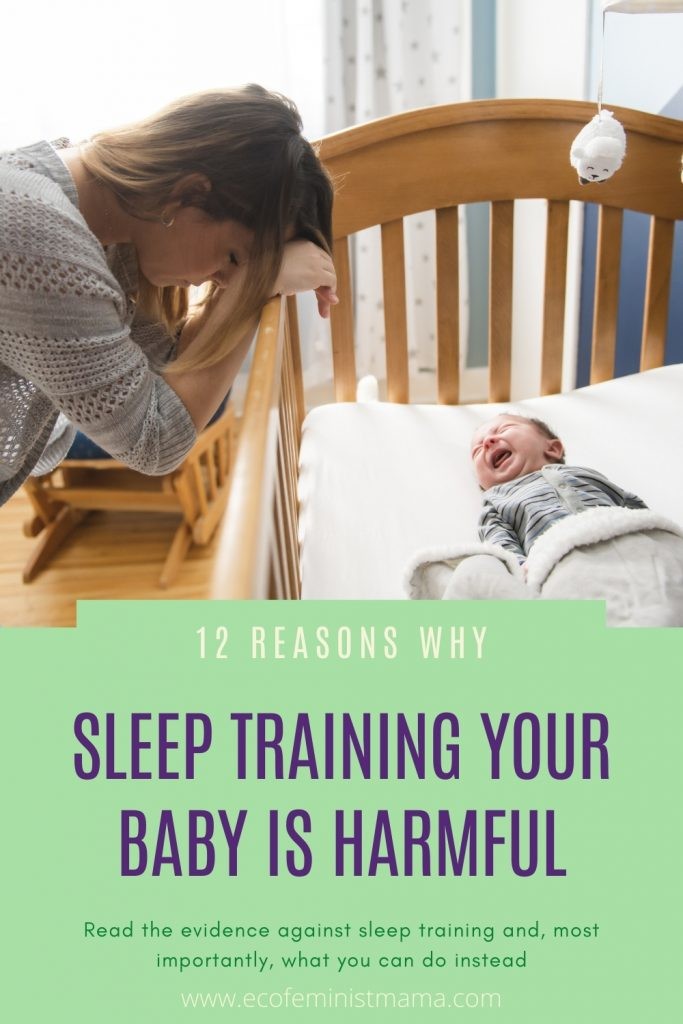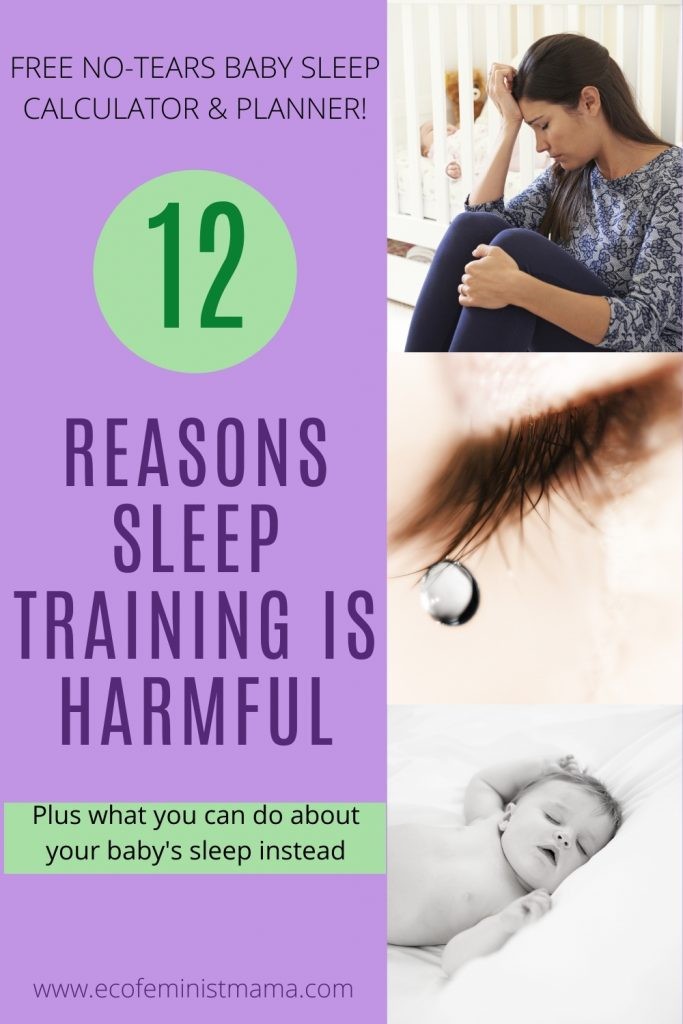Before I became a mother I had never heard of baby sleep training. I had absolutely no idea that up and down the country there are thousands of babies being “trained to sleep”.
Table of Contents
- 1. Psychological damage to your baby
- Get your FREE guide to ethical infant sleep!
- 2. Sleep training ignores your baby’s night-time needs
- 3. Sleep training methods can increase the risk of SIDS
- 4. It can negatively impact breastfeeding
- 6. Sleep training assumes that all babies have the same needs
- 6. Sleep training punishes babies for normal behaviour
- 7. It destroys baby’s trust and damages mother-baby bond
- 8. Sleep training causes stress and anxiety to the parents
- 9. It may cause personality and behavioural disorders
- 10. Sleep training places the wants of adults over the needs of babies
- 11. Baby is trained to not call for help
- 12. It doesn’t even work long-term!
My first introduction to the tearful world of baby sleep training was at a baby group. One week a self-proclaimed “expert” offering very expensive “baby sleep consulting” paid us a visit. Before I knew it I found myself surrounded by mothers comparing how long they leave their babies to cry themselves to sleep
I was completely horrified. It seemed alien and unnatural to me: leave your baby to cry and not DO something about it??
This blog post is an evidence-based list of how sleep training is causing terrible harm to our babies, their mothers, and family relationships.
Definition of “sleep training”: I use the phrase “sleep training” to refer to any baby sleep technique that involves the systematic withholding of comfort. This may be the Cry It Out (CIO) method, “controlled” crying like the Ferber method, and even so-called “gentle sleep training methods” like Pick Up Put Down, Sleep Lady Shuffle or Gradual Retreat.
BABY! This is a reusable block, so whatever edits you make in it will apply everywhere it is used. If you want to remove this disclaimer from a post then be careful to delete the parent block (type ‘Reusable Block’ – icon is lego brick), and not to delete the group, image and/or the paragraph blocks (cos then they’ll be deleted from every instance of the reusable block).
Disclaimer: This post contains ethical affiliate links that I genuinely recommend. I may receive a small percentage of any purchases you make as a result of clicking those links. This comes at no extra cost to you and helps me to run this site. Read my full disclosure
1. Psychological damage to your baby
One major concern about sleep training is the effect that the stress hormone cortisol has on a young and rapidly developing brain. High levels of cortisol are released during times of distress and trauma.
Sleep training methods such as CIO and controlled crying techniques such as the Ferber method intentionally leave babies in a state of distress for prolonged periods of time. Therefore babies who endure sleep training experience intense periods of time when cortisol floods their developing brains.
Cortisol in small amounts is usually no problem, but in higher quantities, regular doses and in the vulnerable, developing brain of an infant it has the potential to cause lasting damage to the brain.
Multiple studies including the ones below have raised enough concerns about the harmful psychological impact of sleep training, crying or chronic stress.
The possible long-term side effects of regular states of distress include stunted growth of the hippocampi (the area of the brain responsible for cognition and memory), chronic disease including lung and cardiovascular disease, and behavioural problems later in childhood.
Relevant studies:
Kaufman, Joan & Charney, Dennis. (2001). Effects of early stress on brain structure and function: Implications for understanding the relationship between child maltreatment and depression. Development and psychopathology. 13. 451-71. 10.1017/S0954579401003030.
Kyle J.J. McLachlan, Catharine R. Gale. (2018). The effects of psychological distress and its interaction with socioeconomic position on risk of developing four chronic diseases. Journal of Psychosomatic Research, Volume 109,Pages 79-85,
Middlemiss W, Granger DA, Goldberg WA, Nathans L. (2012). Asynchrony of mother-infant hypothalamic-pituitary-adrenal axis activity following extinction of infant crying responses induced during the transition to sleep. Early Human Development 88: 227-32.
Smarius, L., Strieder, T., Loomans, E., Doreleijers, T., Vrijkotte, T., Gemke, R. and van Eijsden, M. (2016). Excessive infant crying doubles the risk of mood and behavioral problems at age 5: evidence for mediation by maternal characteristics. European Child & Adolescent Psychiatry, [online] 26(3), pp.293-302.
2. Sleep training ignores your baby’s night-time needs
One of the goals of baby sleep training is to teach babies to “sleep through the night”. There are a couple of problems with this:
1) No-one “sleeps through the night”. Even adults have short periods of wakefulness at the end of their sleep cycle, but we generally don’t realise it.
We only wake fully and become aware of our waking if we have a problem that needs solving, for example needing to go to the toilet, feeling thirsty or needing to settle after having a bad dream.
2) Babies and even older children simply aren’t supposed to be sleeping through the night, all on their own. Just as babies need their carers to fulfill their daytime needs, so they need us to fulfill their night-time needs. These needs might be physiological such as feeling hungry or thirsty, needing a nappy change, being too hot or cold etc. Or they may need emotional comfort, be lonely or scared.
Sleep training tries to to artificially force an infant to sleep alone and through the night without asking for help when they need it. This goes against the biological and evolutionary instinct of being a responsive and nurturing caregiver.
For decades, infant and child development specialists have shown that responsive caregiving which attends to a young infant’s needs as and when they arise (even at 3 o’clock in the morning!) is the best approach to take.
Relevant research and articles:
Australian Association For Infant Mental Health (2002, reviewed 2013). Controlled Crying Position Paper 1
BASIS (Baby Sleep Information Source) Brains, biology & sleep: Vulnerable human babies and their large brains
Ludington, Susan & Cong, Xiaomei & Hashemi, Fariba. (2002). Infant Crying: Nature, Physiologic Consequences, and Select Interventions. Neonatal network : NN. 21. 29-36. 10.1891/0730-0832.21.2.29.
World Health Organisation (2006) Responsive parenting: interventions and outcomes Bulletin of the World Health Organisation
3. Sleep training methods can increase the risk of SIDS
No direct causation link between sleep training and SIDS (Sudden Infant Death Syndrome) exists. However the process of sleep training practices usually relies on the baby sleeping in a separate room to their parents. This is unsafe for babies under 6 months old and possibly under 12 months old due to an increased SIDS risk.
SIDS is defined as the sudden and unexpected death of an infant under 12 months of age, which can’t be explained by any other health conditions. Once over 12 months, it stops being “infant death” purely by definition, but the risk of sudden death syndrome (SDS) is always present to some extent, even into adulthood.
Here in the UK, the recommendation is for babies to sleep in the same room as an adult (for ALL of their sleeping time, not just nighttime) for the first 6 months of life. The American Association of Pediatricians (AAP) recommend increasing this to the 12 months.
There is a very important physiological reason behind this. The carbon monoxide the adult/s in the room breathe out triggers a regular breathing response in the infant. In other words, simply by staying in the same room as your baby while they sleep you are literally helping to make sure they keep breathing.
Meanwhile, the University of Durham research project into infant sleep BASIS states that encouraging babies (especially those under 6 months) to sleep longer than natural may increase the risk of SIDS. An unnaturally long and deep sleep is associated with SIDS risk, and the increased likelihood of sleeping alone only compounds this risk.
Relevant research and articles:
Mosko et al (1998) Maternal proximity and infant CO2 environment during bedsharing and possible implications for SIDS research
American Association of Pediatricians sleep guidelines
BASIS (Baby Sleep Information Source, University of Durham) The Costs of Sleep Training and Sleep Training 2018 fact sheet
The Lullaby Trust Safer Sleep For Babies: A guide for parents
4. It can negatively impact breastfeeding
The World Health Organisation (WHO) recommend 6 months of exclusive breastfeeding and then extended breastfeeding for at least the first two years of life. Just some of the positives effects of breastfeeding include:
- Breast milk helps protect your child from infections and diseases including asthma and diabetes
- Reduces baby’s risk of SIDS
Reduces your child’s risk of developing cardiovascular disease in adulthood - Increases mother-infant bonding and attachment development
- Helps protect mother against diseases including breast cancer, osteoporosis, ovarian cancer and cardiovascular disease
Once again, the separation of mother and baby in the night is usually one of the inevitabilities of sleep training. Along with the attempt to make the baby sleep for longer, this has major health costs. When parents sleep train, night-time breastfeeding is reduced, interrupting and jeopardising the overall supply of breastmilk. Meanwhile, the baby no longer has access to sustenance in the night, which is a crucial aspect to their continued development.
Ironically, the almost magical properties of breastmilk actually HELP infant sleep in the wider scheme of things! It contains melatonin to make baby drift off easily and helps to regulate their circadian rhythms. This means that sleep and wake windows become more consistent and attuned to night and day.
Many sleep training advocates abhor the natural habit of breastfeeding your baby to sleep. But breastmilk and the act of nursing is part of the solution to helping your baby sleep.
Relevant research and articles:
BASIS (Baby Sleep Information Source, University of Durham) The Costs of Sleep Training and Sleep & Feeding Methods
Kam, R IBCLC Nighttime Breastfeeding – 7 Reasons Why It’s So Important
Kent, J.C PhD et al (2005) Volume and Frequency of Breastfeedings and Fat Content of Breast Milk Throughout the Day
La Leche League Breast Milk’s Circadian Rhythms and Sleep Training Or Not?
6. Sleep training assumes that all babies have the same needs
The methodology of all sleep training programs have one fundamental flaw. They give you step-by-step instructions on how to “teach” your baby to sleep and assume that it will work for all babies. No matter their genetics or unique sleep needs. If it doesn’t, you probably did it wrong and need to try harder.
Because sleep training tries to override and ignore your baby’s needs, there is no room for responsiveness to an individual baby’s response to these methods. You just have to plough through the system and keep going until your baby either gives up or you lose your mind.
But what if your baby is crying their eyes out because actually what they need is for you to cuddle or nurse them? And, by the way, these are both very reasonable requests for a small baby to make!
Sleep training tells you to just leave your baby there, either ignoring them or maybe shushing and patting them. But they are clearly communicating to them that they need something else. It might be something physical or emotional. Either way, there is absolutely nothing wrong with you giving it to them. In fact, that is your JOB as their caregiver. It’s OK for you to pick up your lovely sweet baby and follow your and their primal, biological instincts to hold and be held.
6. Sleep training punishes babies for normal behaviour
How many times have you as a mother been asked if your baby is “sleeping through the night yet”? A million times, right? And does it make you second guess yourself each and every time, wondering why your baby is “still” waking up at night?
If you’re a father, grandparent or friends who has asked a mother that question, at what age do you think a baby should be sleeping through the night? A year? 6 months? 3 months, even?
Let’s look at the facts:
- The average 3-month old baby wakes 2.7 times each night*.
- The average 6-month old wakes 3.1 times* (
- Most babies hit sleep “regressions”at 4-5m, 8-10m, 12m, 18m and 24-months, spending several weeks waking up multiple times in the night. This is developmentally normal.
- Over half of all 12-month olds wake during the night and half of them need to parental input to go back to sleep**
- Only 55% of child are sleeping all night long by the time they are 2 years old*
So really, if you’ve got a 6-month old that isn’t “sleeping through the night yet”, well of course you haven’t. Why would you? It’s not normal, natural or even desirable to have a small baby sleep all night without waking. As we know, there are SIDS risks involved with lengthy and deep sleeping in infants under 12-months, but also babies simply have night time needs.
In teaching the baby not to bother their parents during the night, sleep training punishes them for their normal, natural behaviour and needs. You wouldn’t deny your baby food, drink or cuddles in the daytime. Why on Earth would you do that at night?
Referenced studies and articles:
* Burnham, M.M et al (2002), ‘Night-time sleep-wake patterns and self-soothing from birth to one year of age: a longitudinal intervention study’, J Child Psychol Psychiatry, 43(6), pp.713-725
Ockwell-Smith, S. (2017) The Rollercoaster of Real Baby Sleep
** Price, A.M et al (2014), ‘Children’s sleep patterns from 0 to 9 years: Australian population longitudinal study’, Arch Dis Child, 99(2), pp.119-125
7. It destroys baby’s trust and damages mother-baby bond
Since the development of attachment theory by John Bowlby, we have learnt a lot about how babies develop the a personal sense of security.
Older generations have been taught by the likes of Truby King that holding a baby “too much” will ‘mollycoddle and spoil’ them. However, we now know that it is crucial to the fully-rounded emotional and psychological wellbeing of a child to respond to their needs and hold them closely as babies.
This approach of responsive, attachment-focused baby-raising has been shown to result in children and adults who are more emotionally secure, independent, and confident. Mothers who respond to their baby’s nighttime needs have more securely attached babies, who will then grow up to be more secure adults.
These hormonal, physiological bonds between mother and baby are severed through the process of sleep training. Some studies suggest that mothers aren’t as biologically connected with their babies once sleep training has been completed.
Relevant studies:
Higley, E., & Dozier, M. (2009). Nighttime maternal responsiveness and infant attachment at one year. Attachment & human development, 11(4), 347–363.
Hofer, M.A. (1983). The Mother-Infant Interaction as a Regulator of Infant Physiology and Behavior. 10.1007/978-1-4684-4565-7_4.
Hofer, M. A. (2006). Psychobiological Roots of Early Attachment. Current Directions in Psychological Science, 15(2), 84–88. doi:10.1111/j.0963-7214.2006.00412.x
Middlemiss W, Granger DA, Goldberg WA, Nathans L. (2012). Asynchrony of mother-infant hypothalamic-pituitary-adrenal axis activity following extinction of infant crying responses induced during the transition to sleep. Early Human Development 88: 227-32.
8. Sleep training causes stress and anxiety to the parents
So far we have mostly focused on the impact sleep training has on your baby. But the impact it has on the parents is also a potentially incredibly harmful one and shouldn’t be ignored.
The stress and anxiety sleep training causes the parents (particularly the birth mother for biological reasons) has a huge impact. Extinction methods like Cry-It-Out are deeply unpleasant and stressful to inflict upon your household. Even the back-door-sleep-training methods like Sleep Lady Shuffle cause stress by trying to impose strict, unrealistic regimes on babies and their carers.
Sleep training can also cause arguments and rifts between parents. Many couples experience deep tension and terrible arguments due to their differing opinions on how to approach sleep.
Sleep training culture imposes all sorts of “shoulds” and “should-nots” on babies and their parents. But what if we just trusted the mother or other carers of the baby to respond to their child’s needs instead? Surely that would result in much happier, more harmonious households.
9. It may cause personality and behavioural disorders
Sleep training negatively impacts the attachment between babies and their caregivers through a process of deliberate withdrawal of responsiveness to the child’s needs.
The consequence of breaking the attachment bond at this crucial period of brain development is a risk of longer-term personality and behavioural disorders including:
- Developmental delays Children who have suffered from a broken attachment bond may miss out on normal brain development processes that are important for speech and language, social behaviour and emotional self-regulation
- Disordered eating Children with attachment problems often engage in disordered eating practices. These include binge eating, food hoarding, secretly pocketing food and eating too quickly and beyond fullness
- Harmful self-soothing practices This is an extreme response but a very real one. Children whose emotional needs go unmet can turn to habitual practices such as rocking back and forth, deliberately banging their heads and other self-harm behaviours
- Aggression Due to not having their own emotions responded to consistently, some children may take out their feelings of frustration, anger and insecurity on others.
These are some of the longer-terms risks associated with emotional neglect but there may be short-term personality changes as well.
This mother, for example, tells her story of going to a “sleep school” with her baby who endured an intensive sleep training experience. He displayed signs of stress, anxiety and fear at being fed to sleep, put down anywhere, taken into his bedroom and at the sight of his mother leaving the room. She describes how he was no longer his previous, happy self and that it took 6 months for him to trust her to leave his sight.
Relevant articles:
Lacey, E (2019), My Sleep School Experience: My Biggest Regret, The Beyond Sleep Training Project
Perry, B.D (1999), Bonding and Attachment in Maltreated Children: Consequences of Emotional Neglect in Childhood, The Child Trauma Academy
10. Sleep Training Places the wants of adults over the needs of babies
At this point in looking why baby sleep training is harmful, I feel it’s time to look at the parents’ motivation for sleep training. For most if not all, it’s so that they themselves can get more sleep and have an easier time putting baby down in their cot.
The thing about sleep training is that it prioritises the wants of an adult over the needs of the infant. I am not for one minute trying to tell you that you don’t deserve a good night’s sleep or some downtime in the evenings. I want all those things too and I’m not here to tell you you’re wrong for wanting them.
What I am saying, though, is that you are a self-sufficient adult who can find alternative solutions to those issues. It may not be simple, but there are other ways to get some more downtime, more sleep or an easier bedtime. Meanwhile your baby can’t do anything other than rely on you. It is a parent’s job to fulfill their baby’s needs.
Yes, your wants and needs matter too but you can work out a way to resolve that without distressing your baby.
11. Baby is trained to not call for help
Here’s a tragic and true story from a member of a gentle sleep-related Facebook group I’m in:
The original poster (OP) and her friend both had toddlers of the same age, 2.5, who both got ill with a tummy bug. The mothers were chatting and comparing sick notes and the OP described her (non-sleep trained) daughter crying out in the night. She went to see what was wrong. Her daughter said she felt sick and vomited all over the bed. The OP cleaned up her daughter and the bed, then brought her daughter into her own bed to sleep with her for the rest of the night.
The friend, however, had sleep trained her daughter at 4 months old. Her daughter had also woken up in the night and vomited all over the bed. She then lay back down to sleep and her mother went into her room in the morning to find her sleeping in her own dried up vomit.
Obviously the friend was devastated that her daughter had spent the night like that and had not called out for help. Sadly, this is exactly what she had trained her daughter to do. Since she was 4 months old, the girl was taught to just lie down and go back to sleep, no matter what the problem is.
This is the fundamental issue with teaching your child not to disturb you in the night: they learn not to disturb you in the night even when they need to and really should. They don’t know or understand the difference between a “superficial” problem and an “important” problem. To them it is ALL important.
That’s such an important point I’m going to make it again:
ALL their nighttime needs are important
Responding to every single wake up for the last 4 years has been hard work for me, but entirely worth it for one simple fact. I can sleep soundly knowing that my daughter will never EVER be so “well trained” she’ll sleep in her own vomit.
12. It doesn’t even work long-term!
Given all the stress you go through with a sleep training regime, you’d think it would be worth the effort. You’d think your child would then sleep better than all the babies being ‘mollycoddled to sleep’, wouldn’t you? Well, you’d be WRONG.
A study that sought to prove the long-term effectiveness of sleep training performed randomised follow ups to sleep trained and non-sleep trained children. It found there was absolutely no difference in how they slept at night.
Meanwhile, take a look through any regular Facebook mum group. You’ll find dozens of stories about parents needing to “retrain” their babies and toddlers all over again.
Sleep training may be sold to you as ‘a few difficult nights’ that you plough through and then it’s over. In reality you’ll probably need to revisit those tearful nights again and again for months or even years to come
Relevant studies and articles:
Price, A.M.H, et al, (2012), Five-Year Follow-up of Harms and Benefits of Behavioral Infant Sleep Intervention: Randomized Trial Pediatrics 130 (4) 643-651
I wrote this blog for those mothers who are facing sleep training pressure from partners, family members or other mothers. I want you to know that you are right to be wary of sleep training. You’re also right to want to respond to your baby. You’re completely and utterly 100% entitled to make the decisions about how to nurture your baby.
As mothers we are constantly being undermined and made to doubt ourselves and our abilities. Deep down you know exactly what your baby needs and mostly what your baby needs is YOU. I hope this blog helps to remind you of that.
There ARE alternatives to sleep training that are much more ethical and developmentally supportive to your baby. I’ve got a blog post on my top gentle sleep techniques here to help you. There’s also this one on sleep regressions if that’s what you’re going through.
Wishing you all the best on your nighttime parenting journey.
